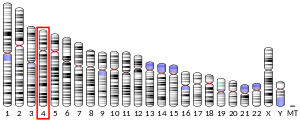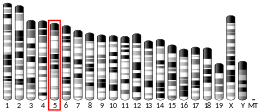LNX1
E3 ubiquitin-protein ligase LNX is an enzyme that in humans is encoded by the LNX1 gene.[5][6][7]
References
- GRCh38: Ensembl release 89: ENSG00000072201 - Ensembl, May 2017
- GRCm38: Ensembl release 89: ENSMUSG00000029228 - Ensembl, May 2017
- "Human PubMed Reference:". National Center for Biotechnology Information, U.S. National Library of Medicine.
- "Mouse PubMed Reference:". National Center for Biotechnology Information, U.S. National Library of Medicine.
- Xie Y, Zhao W, Wang W, Zhao S, Tang R, Ying K, Zhou Z, Mao Y (Apr 2001). "Identification of a human LNX protein containing multiple PDZ domains". Biochemical Genetics. 39 (3–4): 117–26. doi:10.1023/A:1010269908398. PMID 11521506.
- Nie J, McGill MA, Dermer M, Dho SE, Wolting CD, McGlade CJ (Jan 2002). "LNX functions as a RING type E3 ubiquitin ligase that targets the cell fate determinant Numb for ubiquitin-dependent degradation". The EMBO Journal. 21 (1–2): 93–102. doi:10.1093/emboj/21.1.93. PMC 125803. PMID 11782429.
- "Entrez Gene: LNX1 ligand of numb-protein X 1".
- Rual JF, Venkatesan K, Hao T, Hirozane-Kishikawa T, Dricot A, Li N, Berriz GF, Gibbons FD, Dreze M, Ayivi-Guedehoussou N, Klitgord N, Simon C, Boxem M, Milstein S, Rosenberg J, Goldberg DS, Zhang LV, Wong SL, Franklin G, Li S, Albala JS, Lim J, Fraughton C, Llamosas E, Cevik S, Bex C, Lamesch P, Sikorski RS, Vandenhaute J, Zoghbi HY, Smolyar A, Bosak S, Sequerra R, Doucette-Stamm L, Cusick ME, Hill DE, Roth FP, Vidal M (Oct 2005). "Towards a proteome-scale map of the human protein-protein interaction network". Nature. 437 (7062): 1173–8. doi:10.1038/nature04209. PMID 16189514.
Further reading
- Dho SE, Jacob S, Wolting CD, French MB, Rohrschneider LR, McGlade CJ (Apr 1998). "The mammalian numb phosphotyrosine-binding domain. Characterization of binding specificity and identification of a novel PDZ domain-containing numb binding protein, LNX". The Journal of Biological Chemistry. 273 (15): 9179–87. doi:10.1074/jbc.273.15.9179. PMID 9535908.
- Rice DS, Northcutt GM, Kurschner C (Nov 2001). "The Lnx family proteins function as molecular scaffolds for Numb family proteins". Molecular and Cellular Neurosciences. 18 (5): 525–40. doi:10.1006/mcne.2001.1024. PMID 11922143.
- Sollerbrant K, Raschperger E, Mirza M, Engstrom U, Philipson L, Ljungdahl PO, Pettersson RF (Feb 2003). "The Coxsackievirus and adenovirus receptor (CAR) forms a complex with the PDZ domain-containing protein ligand-of-numb protein-X (LNX)". The Journal of Biological Chemistry. 278 (9): 7439–44. doi:10.1074/jbc.M205927200. PMID 12468544.
- Clark HF, Gurney AL, Abaya E, Baker K, Baldwin D, Brush J, Chen J, Chow B, Chui C, Crowley C, Currell B, Deuel B, Dowd P, Eaton D, Foster J, Grimaldi C, Gu Q, Hass PE, Heldens S, Huang A, Kim HS, Klimowski L, Jin Y, Johnson S, Lee J, Lewis L, Liao D, Mark M, Robbie E, Sanchez C, Schoenfeld J, Seshagiri S, Simmons L, Singh J, Smith V, Stinson J, Vagts A, Vandlen R, Watanabe C, Wieand D, Woods K, Xie MH, Yansura D, Yi S, Yu G, Yuan J, Zhang M, Zhang Z, Goddard A, Wood WI, Godowski P, Gray A (Oct 2003). "The secreted protein discovery initiative (SPDI), a large-scale effort to identify novel human secreted and transmembrane proteins: a bioinformatics assessment". Genome Research. 13 (10): 2265–70. doi:10.1101/gr.1293003. PMC 403697. PMID 12975309.
- Katoh M, Katoh M (Apr 2004). "Identification and characterization of PDZRN3 and PDZRN4 genes in silico". International Journal of Molecular Medicine. 13 (4): 607–13. doi:10.3892/ijmm.13.4.607. PMID 15010864.
- Armbruester V, Sauter M, Roemer K, Best B, Hahn S, Nty A, Schmid A, Philipp S, Mueller A, Mueller-Lantzsch N (Oct 2004). "Np9 protein of human endogenous retrovirus K interacts with ligand of numb protein X". Journal of Virology. 78 (19): 10310–9. doi:10.1128/JVI.78.19.10310-10319.2004. PMC 516385. PMID 15367597.
- Chen J, Xu J, Zhao W, Hu G, Cheng H, Kang Y, Xie Y, Lu Y (Nov 2005). "Characterization of human LNX, a novel ligand of Numb protein X that is downregulated in human gliomas". The International Journal of Biochemistry & Cell Biology. 37 (11): 2273–83. doi:10.1016/j.biocel.2005.02.028. PMID 16002321.
- Lim J, Hao T, Shaw C, Patel AJ, Szabó G, Rual JF, Fisk CJ, Li N, Smolyar A, Hill DE, Barabási AL, Vidal M, Zoghbi HY (May 2006). "A protein-protein interaction network for human inherited ataxias and disorders of Purkinje cell degeneration". Cell. 125 (4): 801–14. doi:10.1016/j.cell.2006.03.032. PMID 16713569.
- Weiss A, Baumgartner M, Radziwill G, Dennler J, Moelling K (Oct 2007). "c-Src is a PDZ interaction partner and substrate of the E3 ubiquitin ligase Ligand-of-Numb protein X1". FEBS Letters. 581 (26): 5131–6. doi:10.1016/j.febslet.2007.09.062. PMID 17936276.
This article is issued from Wikipedia. The text is licensed under Creative Commons - Attribution - Sharealike. Additional terms may apply for the media files.



